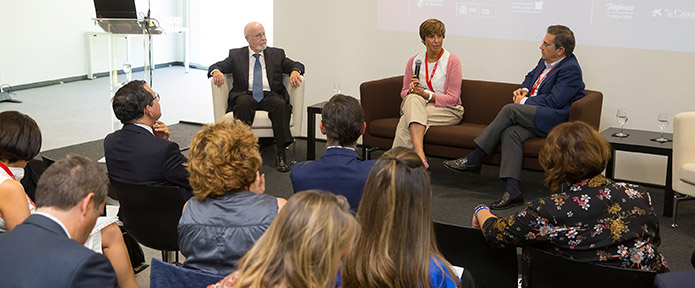Commitment to innovative and differential projects and good communication, keys to congress International Museum Reputation
The conference, organized by the University of Navarra, the Museo Nacional del Prado and Corporate Excellence, brought together 150 participants from seven countries.

Innovation, differentiation, good communication to the public and synergies. These are some of the keys revealed by the congress International Museum Reputation Conference, held from Wednesday to today at the Museo Universidad de Navarra. The conference, in which more than 150 people from seven different countries participated, was organized by the University of Navarra, the Museo Nacional del Prado and Corporate Excellence - Centre for Reputation Leadership. They have also received the support of Fundación Telefónica and Fundación bancaria LaCaixa.
Ángel Alloza, CEO of Corporate Excellence, gave the concluding session, entitled Final Learnings: building together the future of the reputation of museums and companies, in which Juan Manuel Mora, Vice President of Communication of the University of Navarra; Ángel Gómez Montoro, president of board of trustees of the Museo Universidad de Navarra; and Marina Chinchilla, deputy director of Administration of the Museo Nacional del Prado, also took part.
In this meeting, Alloza stressed the importance of having had a perspective multidisciplinary in the congress: academic, museum and business. He also emphasized the current context, in which museum and cultural activities have multiplied, a scenario that "has direct implications for management". In this sense, he stressed the importance of differentiation, "how to ensure that our museums have their own identity and that they build this differentiation from the management of their brand".
The CEO of Corporate Excellence explained that the congress offered keys to building the reputation of museums through partnership with companies and the irreplaceable role of good communication: "It is impossible to manage intangibles without listening to the expectations of your stakeholders, delivering realities and communicating them intensively". Therefore, "brand, identity, values, reputation and communication are the most important intangibles. The symbolic value has a direct impact on Economics , which in the case of museums exceeds 90% of the value". Thus, he stressed that "it is core topic to learn how to manage these intangibles in an excellent way. The benefit we obtain is a differentiation that cannot be copied".
In his speech he also reminded us that "reputation is built with those stakeholders on whom our future depends. We do not build it for them, but with them. Reputation is collective perceptions and evaluations".
As for the challenges, he pointed out the need to continue working in a coordinated way along these lines: "The good news, which promises us a tremendously enriching alliance between museums and companies, is that confidence in the third sector and in companies has been growing. This trust and synergy between museums, companies, cities, countries, public opinion and administrations is based on reputation. It is the only win-win concept.
